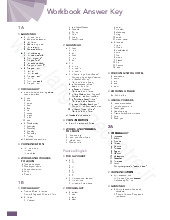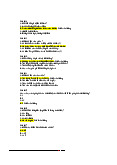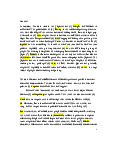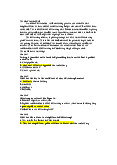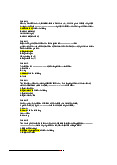



Preview text:
SENCOND & THIRD CONDITIONALS (Câu điều kiện loại 2 & 3) I.
CÂU ĐIỀU KIỆN LOẠI 2
1. Cách sử dụng:
Câu dùng để diễn tả tình huống, hành động không có thật, không thể xảy ra ở hiện tại và cũng không xảy ra ở tương lai. 2. Cấu trúc: -
If they had enough money, they would buy a bigger If + S
house. (Nếu họ có đủ tiền, họ sẽ mua căn nhà to + V2/ed (past simple), hơn.)
S + would/ could/might + V0. -
If I were you, I would take that job. (Nếu tôi là bạn,
tôi sẽ nhận công việc đó.) Lưu ý: -
Mệnh đề điều kiện (If) có thể đứng ở vế đầu hoặc vế sau của câu. -
Ở mệnh đề If (If clause) của câu điều kiện loại 2, nếu động từ ở dạng to be, ta dùng WERE cho tất cả các ngôi.
Bài tập: Choose the correct answer. (IF 2)
1. If I (were/was/would be) ....................... rich, I (will try/would try/tried) ....................... to help the poor.
2. What (would you do/will you do/did you do) ....................... if you (see/would see/saw) ....................... a huge spider in your shoe?
3. If I (was/would be/were) ....................... you, I (asked/would ask/will ask) ....................... for their help.
4. If he (finded/would find/found) ....................... a wallet in the street, he (would
take/took/taken) ....................... it to the police.
5. If she (were/was/would be) ....................... a color, she (is/would be/were) ....................... red.
6. They (were/would be/will be) ....................... terrified if they (saw/see/would see) ....................... aliens in their garden. II.
CÂU ĐIỀU KIỆN LOẠI 3
1. Cách sử dụng:
Dạng câu dùng để diễn tả một giả thiết không có thật trong quá khứ và dẫn đến một kết quả cũng không
có thật trong quá khứ. 2. Cấu trúc:
Last night, if that man hadn’t driven carelessly, he
wouldn’t have caused that accident. If + S + had V3/ed,
→ Đêm qua, nếu người đàn ông đó đã không lái xe ẩu,
S + would/ could/might/… + have + V3. anh ta đã không gây ra vụ tai nạn đó.
( Trên thực tế, vào đêm qua, anh ta đã lái xe ẩu và đã gây ra vụ tai nạn đó. )
Bài tập: Chia các động từ trong ngoặc thành thể phù hợp.
1. Last night, if that woman ………..…… (drive) carelessly, she …………….… (not cause) that accident.
2. That employee …………..… (not lose) his job if he ………………… (work) efficiently.
3. Yesterday, if that boy ……………… (not break) the vase, his father ……………… (not be) mad.
4. Last month, I …………….… (not meet) him if I …………………… (not go) to that party.
5. That day, she ………………..… (not find) her dog if she ………………… (not go) into the garden.
6. Yesterday, if my brother ………………… (do) his homework, his teacher …………… (not scold) him.
7. Last Friday, if she …………….… (know) your phone number, she ……………..… (call) you.
BÀI TẬP TỔNG HỢP CÂU ĐIỀU KIỆN 1, 2, 3
1. If I (have) ________ a typewriter, I could type it myself.
2. If I had known that you were in hospital, I (visit) ________ you.
3. You could make much progress if you (attend) ________ class regularly.
4. If I (know) ________ his telephone number, I would give it to you.
5. If you (arrive) ________ ten minutes earlier, you would have got a seat.
6. If he (study) ________ harder, he can pass an exam.
7. She may be late if she (not hurry) ________.
8. Tell him to ring me if you (see) ________ him.
9. If you (speak) ________ more slowly, he might have understood you.
10. What (you do) ________ if you got fat?
11. If you are kind to me, I (be) _______ good to you.
12. He (come) _______ if you waited.
13. If you (ring) _______ the bell, the servant would come.
14. If I had known that the baby was hungry, I (feed) _______ him.
15. If it (not, rain) _______ a lot, the rice crop wouldn’t grow.
16. If today (be) _______ Sunday, we wouldn’t have to work.
17. If she had had your address, she (write) _______ to you.
18. We lost the match. If you (play) _______ for us, we (win) _______.
19. They would not be paid unless they (do) _______ their work well.
20. If I became very rich, I (build ) _______ a hospital for the poor.
21. If he (give) _______ up smoking, as his doctor orders, he will be soon well again.
22. He (not, have) _______ an accident if he had not been driving so fast.
23. If she (write) _______ more carefully, she might not have made too many mistakes.
24. You would have to stay in bed unless your health (improve) _______.
25. If I (have) ________ a typewriter, I could type it myself.
26. If we meet at 9:30, we (have) _________________plenty of time.
27. If you (find) _________________ a skeleton in the cellar, don't mention it to anyone.
28. The zookeeper would have punished her with a fine if she ( feed) _________________ the animals..
29. If you pass your examination, we (have) _________________a celebration.
30. Lisa would find the milk if she (look) _________________ for it in the fridge. WISH I.
Cách dùng ‘wish’ để ước về hiện tại.
– Thể hiện mong ước về một điều gì đó không có thật ở hiện tại hoặc giả định một điều trái ngược so với hiện tại.
– Cấu trúc: (Giống mệnh đề if câu điều kiện loại 2)
(+) S + wish (es) + (that) + S + V2/ed.
(-) S + wish (es) + (that) + S + didn’t + V (bare infinitive).
*Lưu ý: Nếu V ở đây là ‘be’, trong câu khẳng định, ta dùng ‘were’ cho tất cả các loại chủ ngữ. Tuy nhiên,
trong những hoàn cảnh giao tiếp không trang trọng, ta có thể dùng ‘was’ và ‘were’ tương ứng với từng chủ ngữ như bình thường. – Ví dụ:
I wish I were taller. (Tôi ước là phải chi tôi cao hơn.)
They wish they had a bigger house. (Họ ước họ có một căn nhà lớn hơn.)
The children wish they didn’t have to go to school today. (Lũ trẻ ước chúng không phải đi học hôm nay) II.
Cách dùng ‘wish’ để ước về quá khứ.
– Thể hiện mong ước hay sự nuối tiếc về một việc không có thật ở quá khứ hoặc giả định một điều gì đó trái ngược với quá khứ.
– Cấu trúc: (Giống mệnh đề if câu điều kiện loại 3)
(+) S + wish(es) + (that) + S + had + V3
(-) S + wish(es) + (that) + S + had not + V3 – Ví dụ:
+ She wishes that she hadn’t quit her job last month. (Cô ấy ước là cô ấy đã không nghỉ việc tháng trước.)
+ My parents wish they had bought that house when it was still cheap. (Bố mẹ tôi ước là bố mẹ tôi đã mua
căn nhà đó khi nó vẫn còn rẻ.) III.
Cách dùng ‘wish’ để ước về tương lai.
– Diễn tả mong ước về một điều gì đó trong tương lai. – Cấu trúc:
(+) S + wish(es) + (that) + S + would/could + V
(-) S + wish(es) + (that) + S + would/could + not + V – Ví dụ:
+ He wish he would become a singer in the future. (Thằng bé ước nó sẽ trở thành một ca sĩ trong tương lai.)
+ I wish it would stop raining. I want to go out. (Tôi ước trời sẽ tạnh mưa. Tôi muốn ra ngoài.) IV. Bài tập
Bài 1: Cho dạng đúng của động từ trong ngoặc. 1.
I wish you (go)…………………………………………. to the theater with me. 2.
I wish I (have)……………………………………………………….. a lot of money. 3.
I wish I (study)………………………………………… a school in Switzerland. 4.
I wish I (not/ spend)…………………………………………….. time to surf TikTok. 5.
I wish the weather (be)…………………………………… cool, so we could go to the beach. 6.
I wish I (talk)……………………………………………………… him that I love him. 7.
I wish he (go) …………………………………………… to the exhibition. 8.
She wishes Nick (call) …………………………………………… her. 9.
Tim wishes he (write) …………………………………………… the letter. 10.
Kate wishes Sally (send) …………………………………………… an SMS. 11.
I wish Tim (arrive) …………………………………………… in time. 12.
They wish they (go) …………………………………………… to the gym. 13.
We wish we (buy) …………………………………………… this computer. 14.
I wish Mona (be) …………………………………………… happy. 15.
Sam wishes he (go) …………………………………………… to Spain. 16.
They wish they (win) …………………………………………… the game. 17.
I wish I (play) …………………………………………… my computer. 18.
Paul wishes he (take) …………………………………………… his sister with him. 19.
I wish I (buy) …………………………………………… a new car.
Bài 2: Chuyển các câu sau sang cấu trúc wish ở quá khứ
1. Tim has lost his passport.
Tim wishes ______________________________________________________
2. Sue quarreled with her parents.
Sue wishes ______________________________________________________
3. Pete hasn’t arrived in time.
Pete wishes ______________________________________________________
4. Mona didn’t go to the university.
Mona wishes _____________________________________________________
5. I’ve got a terrible headache.
I wish ___________________________________________________________ 6. Nick has broken his leg.
Nick wishes ______________________________________________________
7. They didn’t see that wonderful film.
They wish _______________________________________________________
